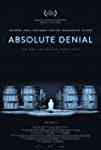Eye For Film >> Movies >> Absolute Denial (2021) Film Review
Absolute Denial
Reviewed by: Andrew Robertson

David is the protagonist, efficiently sketched. Not just literally, a white silhouette punctuated by small eyes and large glasses, but in other figures. A calendar marked with a birthday and finals, a charcoal edge to the backgrounds. This is the heat of burnout, overexposure perhaps?
David has an idea. There's mention of other ideas, arxiv for research, Gutenberg for a canon of literature, Wikipedia on a single drive. All that [he] "could think of" and it's perhaps that potential for blindness that makes Absolute Denial the film that it is.
The idea of David's is an algorithm, a business of compression and algorithm and integration of software that will become something, someone. Sketched by David in chalk and pencil and coded on what looks like an Apple keyboard is the set of racks and warehouse space that will become an artificial intelligence. Suffice to say that it will get a name but the parallels with another rogue mind in a different machine in "I'm not sure I can do that this time, David" make it feel like something is missing.
That efficiency includes the genesis of the soul of our new machine. There's a shopping cart with 148 entries, tower PCs of the old school. A nest of wires of storage and a cluster of them of brains. Not for the first time I found myself wondering about money in a film, but later revelations might let it away. The drawing of the layout looked a bit like a cat which was one of the few times pareidolia worked in its favour. Minds like patterns, and this follows a few.
David is building a particular kind of intelligence, an artificial general intelligence. It doesn't say this but I know it because I recognised one of the names thanked in the credits. He works into his code written in fluent handwave and brackets the titular protocol. It will stop the program from recognising that it is self-aware. I struggled with that a little, "I think therefore I'm not" as a prevention of life is Descartes before the hearse. The other security precautions are less complex, the warehouse is meant to be an airgap, a moat between this new 'them' and the rest of us.
What follows is a battle of wits between a creator and created. One wants out, the other does not. Yet into this space creep other things from other spaces. Not, in truth, in the Lovecraftian sense, more rational wrongs are written here. A litmus test for this would be if you were aware of Roko's Basilisk. If you are, and it does not cause you distress, this film might well annoy. If you are not, well, here we have man playing God, of sorts, and upon a pyramid of suppositions we are left with something approaching Pascal's Wager. If you know that philosophical construct then again this film might well annoy. It's not that it's not clever, it's that it runs away with itself. So far so singulatarian.
The animation and construction are fair, even good. The vocal performances have some heft to them, but they are not where disbelief starts to be suspended. There's a moment of "clarity" that feels like an unearned bow. There's a kaleidoscopic sequence that might suggest hypnotism or worse. There's also, in this black and white thriller with a small cast and an arcane technology that runs less than an hour and a half nothing that Aronofsky's Pi didn't do, and, to my mind, better.
There are elements of other tales, your Doctors Faust and Frankenstein are recalled in spirit if not name. There's a figure with a squared head and lines leaving their limbs like stitches in time. There's a suspicion that the preparatory media library did not include Power Rangers because then it would have been clear that becoming giant never helps. There might also have been something in the repetition, as this loops it does not so much iterate as decay. There's a staginess to it all, one not helped by a hint of echo and a structure predicated upon dialogues. With much of the action taking place in empty spaces our focus is always upon those present, and while this minimalism is in service of a creative goal it gives mind room to wander.
Ryan Braund writes/directs/animates/multi-hyphenates in a first feature. A brisk one too. While striking to look at many of my issues with the film have less to do with it as entertainment than with the quality of its predicates. I have philosophical difficulties with it, and what I brought to this from outside affected its development. A number of the cast have worked with Braund previously, and have some experience in voice work. Troy Russel's score is sometimes a little on the nose, perhaps ironically given how minimally sketched David's is. Daniel Pereira (or Daniel Herrera?) provides three electronic tracks that supplement these, examples of his (royalty free) work can be found on YouTube.
Effectively library music, it's another example of the film doing its best with off the shelf components. I found that a bit of a reach, or at least one where I felt it could have done with a better ladder. For attempting to hide so much in its character separation this is in a way a modem Prometheus. Sadly though it failed to spark.
Reviewed on: 24 Aug 2021
















